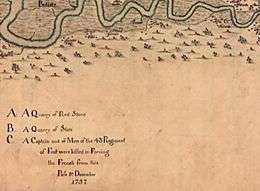Battle of Bloody Creek (1757) facts for kids
Quick facts for kids Battle of Bloody Creek |
|||||||
|---|---|---|---|---|---|---|---|
 The letter "C" at the top right marks the location of Battle of Bloody Creek, Annapolis River Map c.1759, Province House (Nova Scotia) |
|||||||
|
|||||||
| Belligerents | |||||||
Mi'kmaq militia Acadian militia |
|||||||
| Commanders and leaders | |||||||
| Captain Peter Pigou † Captain David Maitland |
Acadian - Guillaume Jeanson | ||||||
| Strength | |||||||
| 130 soldiers | Between 50 and 56 Acadians and Mi'kmaq | ||||||
| Casualties and losses | |||||||
| 24 killed and wounded | 12 killed and wounded | ||||||
|
Designations
|
|
| Official name: Bloody Creek National Historic Site of Canada | |
| Designated: | 1930 |
|---|---|
The Battle of Bloody Creek was an important fight during the French and Indian War. It happened on December 8, 1757. In this battle, a group of Acadian and Mi'kmaq fighters defeated British soldiers. The battle took place near what is now Carleton Corner, Nova Scotia, Canada. This area was once known as the René Forêt River, which flows into the Annapolis River. Interestingly, another battle had happened at this exact spot back in 1711 during Queen Anne's War.
Contents
Why Did the Battle Happen?
Life After the French Defeat
After the French lost the Battle of Fort Beauséjour in 1755, things changed a lot for the Acadians. Many were forced to leave their homes in what was called the Great Expulsion. Because of this, many Acadians formed small fighting groups. They often teamed up with their old friends, the Mi'kmaq people. These groups used guerrilla tactics, which means they fought in small, surprise attacks. They operated all over Nova Scotia. One famous leader of these groups was Joseph Broussard, also known as Beausoleil.
British Struggles to Control the Area
Even though the British controlled important places like Halifax, Annapolis Royal, and Fort Beauséjour, they couldn't fully control the whole region. The Acadian and Mi'kmaq fighters kept causing trouble for them.
The Ambush That Started It All
On December 6, 1757, a group of British soldiers from the 43rd Regiment was cutting wood. They were near the spot where the 1711 battle had taken place. Suddenly, Acadian and Mi'kmaq fighters ambushed them. One British soldier was killed, and seven others were captured.
To get the prisoners back, the British sent a group of 130 soldiers. This group was led by Captain Peter Pigou.
The Battle of Bloody Creek
The Attack Begins
The Acadian and Mi'kmaq fighters were led by an Acadian named Guillaume Jeanson. The British soldiers marched along the south side of the Annapolis River. It was wet and cold, and they couldn't find the prisoners.
On the morning of December 8, the British were crossing a bridge over the René Forêt River. This was the perfect moment for the Mi'kmaq and Acadians to attack. They launched a surprise assault on the British force.
A Quick and Bloody Fight
The British soldiers tried to fight back, but they didn't last long. They suffered many losses, including their leader, Captain Pigou, who was killed. The remaining British soldiers had to retreat quickly back to Annapolis Royal.
What Happened After the Battle?
Continuing Resistance
Even though the Mi'kmaq and Acadian fighters won this battle, they didn't try to attack Annapolis Royal itself. However, many other similar groups continued to bother British forces in Nova Scotia. They kept setting up ambushes and helping the French regular army until the war ended.
A New Name for a Historic Place
After the battle, the René Forêt River was renamed Bloody Creek. This new name was given to remember the important fight that happened there. Today, the place where the battle took place is recognized as a National Historic Site of Canada.
 | Misty Copeland |
 | Raven Wilkinson |
 | Debra Austin |
 | Aesha Ash |

